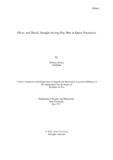| dc.contributor.advisor | Noman, Dr. Sayeed | |
| dc.contributor.author | Zishan, Rubaiya | |
| dc.date.accessioned | 2022-11-21T07:34:50Z | |
| dc.date.available | 2022-11-21T07:34:50Z | |
| dc.date.copyright | 2022 | |
| dc.date.issued | 2022-05 | |
| dc.identifier.other | ID: 19103044 | |
| dc.identifier.uri | http://hdl.handle.net/10361/17601 | |
| dc.description | This thesis is submitted in partial fulfillment of the requirements for the degree of Bachelor of Arts in English, 2022. | en_US |
| dc.description | Cataloged from PDF version of thesis. | |
| dc.description | Includes bibliographical references (pages 61-64). | |
| dc.description.abstract | The majority of countries and people continue to believe that those who do not fit into a binary
gender scale are not 'normal.' They overlook the fact that gender is merely a social construct.
Sexual orientation is not a fixed trait; rather, it varies from person to person. Because females
are not the norm of society and are only the second sex, the world has seen and continued to
see discriminations against them. Similarly, individuals of the LGBTQ+ community face
increased discrimination in a variety of areas as they challenge the socially established gender
notion as well as society's expectations. People who do not fit into society's mainstream norm
are frequently stigmatized. The majority of them are seen as outsiders in society. The term
"queer" refers to anything out of the ordinary or contrary to society's dominant norms. Queer
theory emerged from the third wave of feminism, and it challenges society's dominant norm as
it imposes its regulations on those who ref use to accept them. Since LGBTQ+ people are rarely
at the center of society, they are also known as queer people. The queer narratives are great
initiatives for changing heteronormative culture and ensuring a safe environment for LGBTQ+
individuals by advocating tolerance. However, because the storylines frequently end in sorrow
and tragedy, the narratives unknowingly reinforce the ideas of a straight society as the authors
try to portray a piece of reality. Since the stories are not fantasy, the authors are unable to depict
something unrealistic that is outside of their setting. Numerous working factors impact a same sex couple's tragic future, including their conflict with morality and desire, as well as societal
expectation, religious conviction, and, most importantly, parental support. These factors are
the driving force that encourage queer people act like a straight person throughout the rest of
their life which push them toward a tragic ending both in reality and fiction which reinforce
the ideologies of heteronormative society continuously. | en_US |
| dc.description.statementofresponsibility | Rubaiya Zishan | |
| dc.format.extent | 64 Pages | |
| dc.language.iso | en_US | en_US |
| dc.publisher | Brac University | en_US |
| dc.rights | Brac University theses are protected by copyright. They may be viewed from this source for any purpose, but reproduction or distribution in any format is prohibited without written permission. | |
| dc.subject | Queer | en_US |
| dc.subject | LGBTQ+ | en_US |
| dc.subject | Queer narrative | en_US |
| dc.subject | Tragic ending. | en_US |
| dc.subject.lcsh | Queer theory in literature | |
| dc.subject.lcsh | Homosexuality in literature | |
| dc.title | Oliver and David: Straight-Acting Gay Men in Queer Narratives | en_US |
| dc.type | Thesis | en_US |
| dc.contributor.department | Department of English and Humanities, Brac University | |
| dc.description.degree | B.A. in English | |

